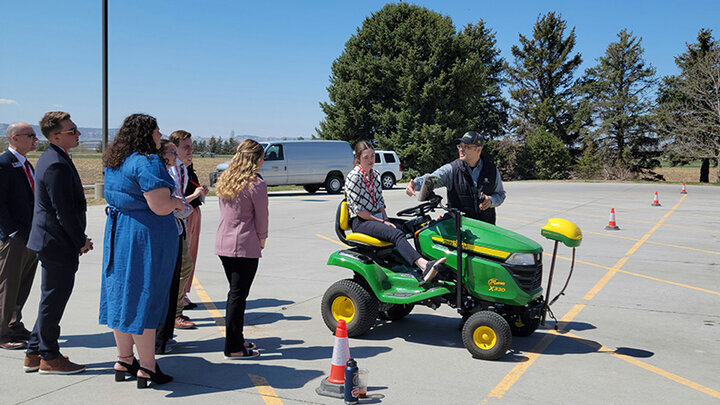The World Food Prize Western Nebraska Youth Institute celebrated a day of agriculture, education, and some young scholars on April 24 at the University of Nebraska-Lincoln Panhandle Research Extension and Education Center (PREEC) in Scottsbluff.
Students studied food insecurity in various countries and presented their findings and solutions to a panel of PREEC researchers.
“I thought it was an interesting project to take part in, and it was something I’d never heard of before,” said Morgan Lile, a student at Ogallala High School. “My country was Fiji, and I chose sustainable agriculture. And just how certain practices are kind of harmful that they are doing currently. I presented some ways to help prevent that harm to the ecosystem and help hunger.”
The students studied their chosen countries and the issues they were facing in food insecurity. They found solutions were not easy.
“So, how do we do that in a sustainable way so we continue to feed people now to 9.7 billion people in 2050,” said Renee Donner, UNL Agricultural Leadership, Education and Communication, and World Prize Nebraska Youth Institute coordinator. “They are also tackling issues on climate change and conflict in Brazil, so not only talking about the production side of global food security but also social determinants of food security.”
Students spent the afternoon participating in hands-on activities at the 21st Century STEM trailer, learning more about technology, and making farmers’ lives easier.
Dezyrae Hausmann, of Alliance, sat in the seat of a riding lawnmower as it drove through cones and then among fellow students demonstrating driverless technology. At the end of the course, she stopped the lawnmower and turned it around, much like a farmer would do in a field.
The students also joined Vesh Raj Thapa, a postdoctoral research associate at the PREEC Soils Fertility Lab. He discussed different soils, the importance of soil fertility, and how they measured moisture in the soil.
The Husker Beef Lab was also in the parking lot, where the students learned about the diets of cattle diets from Karla Wilke, Nebraska Extension cow-calf specialist.
“We learned a little about the stomach and digestive system, and they eat a lot of unusable bi-products,” Lile said.
To get a better picture of the inside of cattle, the students each had the opportunity to interact with a fistulated steer.
“We stuck our hand in the rumen and got to feel all this really interesting stuff. It was so cool. It was also surprising I didn’t expect to feel its heartbeat through its stomach,” she said.
The day cumulated in the awards ceremony, with each student getting a certificate, recognizing them as Borlaug Scholars.
“We’re hoping that they really can take away some tangible efforts that they can do in their own communities, even if they don't want to go on and have a background in global food security,” said Donner.
To learn more about the World Food Prize Western Nebraska Youth Institute, visit http://casnr.unl.edu/worldfoodprize.




